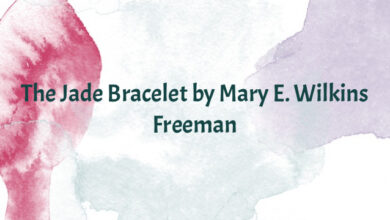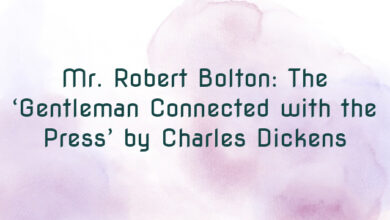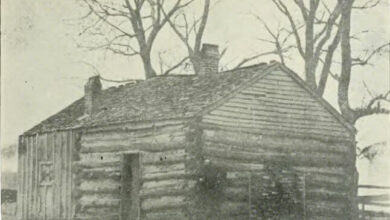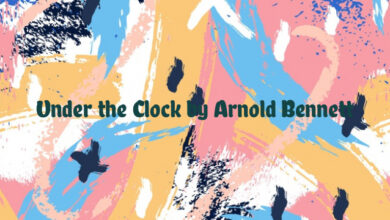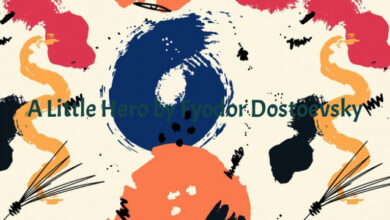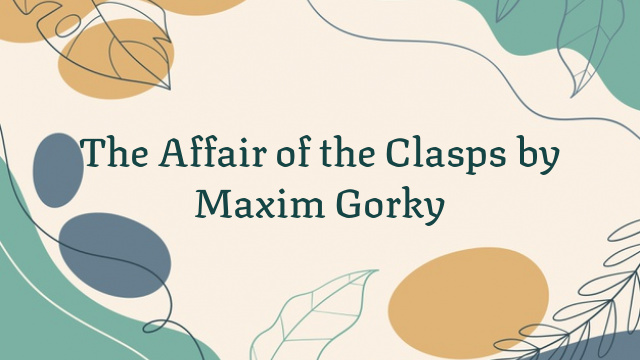
The Affair of the Clasps by Maxim Gorky
The Affair of the Clasps is a short story published in Gorky’s collection, The Outcasts and other Stories (1905). It was translated by Vera Volkhovsky.
There were three of us friends—Semka[1] Kargouza, myself, and Mishka,[2] a bearded giant with great blue eyes that perpetually beamed on everything and were always swollen from drink. We lived in a field beyond the town in an old tumbledown building, called for some reason “the glass factory,” perhaps because there was not a single whole pane in its windows, and undertook all kinds of work, despising nothing; cleaned yards, dug ditches and sewers, pulled down old buildings and fences, and once even tried to build a henhouse. But in this we were unsuccessful. Semka, who was pedantically honest about the duties he took upon himself, began to doubt our knowledge of the architecture of hen-houses, and one day at noon, when we were all resting, took the nails that had been given out to us, two new planks, and the master’s axe to the public-house. For this we lost our work, but as we possessed nothing no one demanded compensation.
We struggled on, living from hand to mouth,[3] and all three of us felt a very natural and lawful dissatisfaction with our fate. Sometimes this took an acute form, giving us a hostile feeling to all around us, and drawing us into somewhat riotous exploits provided for in the “Statutes on Penalties inflicted by the Justices of the Peace”; but as a rule we were weighed down by a dull melancholy, anxiously preoccupied in the search of a meagre earning, and responded but feebly to all those impressions which we could not turn to material advantage. In our spare time—and there was always more of it than we required—we built castles in the air. Semka, the eldest and most matter-of-fact of us, was a thick-set, Penza-born peasant. He used to be a gardener, but, ruined by drink, as fate willed it, he struck at the town of K—— a year ago, on his way to the Nigny Fair, where he hoped somehow to “get on.” His dreams, the embittered sceptic’s, took a clear and definite form. He required but little.
“Damn my soul!”[3] he used to say, when we, lying on our empty stomachs on the ground, somewhere in the shade, beyond the town, tried to illumine our future, little by little, but insistently looking into its darkness.
“If I could just cut to Siberia. I’d make my way there, meet a good business-like man, apprentice myself to him directly. ‘Take me, mate,’ I’d say, ‘to share your luck. Pals in prison, pals in hunger.’ Then I’d polish off one or two little jobs with him. That would be something like. Ye-es.”
“Why should you go to Siberia particularly?” I asked him once.
“Why? It’s there the real smart ones are, man. Lots of ’em—easy to find. But here—here you can’t for the life of you find a good one. As for trying alone, you’d only go hang for nothing. Not used to it. Skill it wants—experience.”
Mishka could not express his dreams in words, but there was not the slightest doubt that he dreamed continually and persistently. You had but to look at his good-natured blue eyes, always gazing into space, at his gentle tipsy smile, constantly parting his thick moustache and beard, which always contained some extraneous matter, such as bird’s feathers, bits of straw, a shaving or two, breadcrumbs, pieces of eggshell, etc.; you had but to glance at his simple open face to see in him the typical peasant-dreamer. I had my dreams too, but the direction of my thoughts is even now interesting to no one but myself.
We had all three met in a night shelter a fortnight or so before the incident I want to describe, deeming it interesting. In a day or two we were friends—that is, went everywhere together, told each other our aims and wishes, divided everything that fell to one equally amongst us, and, in fact, made a tacit defensive and offensive alliance against Life, which treated us in an extremely hostile manner.
During the day we tried with great energy to find something to saw or take to pieces, to pull down, to dig, to carry, and, if such an opportunity occurred, at first set to work with a will.
But, perhaps because each of us in his heart thought himself destined for the fulfilment of higher-business than, for instance, the digging of cesspools, or cleaning them, which is still worse, I may add, for the information of those not initiated into that art, after some two hours of the work our ardour somewhat abated. Then Semka would begin to doubt its necessity.
“They dig a ditch … And what for? For slops. Why can’t they just pour them out on the ground? ‘Won’t do. They’ll smell,’ they say. Get along with you! Slops smell! What stuff people do talk, just from having nothing to do. Now throw a salt cucumber[4] out. Why should it smell if it’s a little one? It’ll lie there a day or two, and there you are—it’s gone, rotted away. If you throw a dead man out into the sun, now, he’ll smell a bit, to be sure, for it’s a big carcass.”
[4] A very common food in Russia.—TR.Such reasoning and conclusions on Semka’s part considerably damped our ardour for work. And this was rather advantageous for us if the job was by the day, but if it was by the piece it invariably happened that we took our wages and spent them on food before the work was finished. Then we used to go to our employer to ask for a “pribavka”;[5] he generally told us to clear out, and threatened, with the help of the police, to make us finish the job already paid for. We argued that we could not work hungry, and more or less hotly insisted on the “pribavka,” which in the majority of cases we got. Of course it was not exactly honourable, but really it was extremely advantageous, and it is not our fault if life is so clumsily arranged that the honourable and the advantageous nearly always clash. The wages disputes with our employers Semka always took upon himself, and really he conducted them with an artist’s skill, detailing the proofs of his rights in the tones of a man worn out with work and exhausted by the burden of it.
[5] Lit., “an addition,” i.e. additional wage.—TR.Meanwhile Mishka looked on in silence, and blinked his blue eyes, smiling from time to time with his good-natured, kindly smile, as if he were trying to say something but could not summon up courage. He generally spoke very little, and only when half-seas-over was he capable of delivering something like an oration.
“Bratsi!”[6] he would then cry, smiling, and his lips twitched curiously, his throat grey husky, and he would cough for some time after the beginning of the speech, pressing his hand to his throat.
[6] Diminutive of “brothers.”—TR.“W-e-ll?” would be Semka’s impatient and ungracious encouragement.
“Bratsi! We live like dogs, we do. And worse even. And what for? Nobody knows. But I suppose by the will of God. Everything is done by His will—eh, bratsi? Well, then—So there … it shows we deserve to live like dogs, for we are bad men. We’re bad men, eh? Well, then—Now I say, serve’em right, the dogs. Isn’t it true what I say? So it shows it’s for our sins. And we must put up with it, eh? Isn’t it true?”
“Fool!” briefly and indifferently answered Semka to the anxious questioning of his comrade. And the other would penitently shrink up into himself, smile timidly, and fall silent, blinking his eyes, which he could scarcely keep open from drunken sleepiness.
Once we were in luck.
We were waiting for likely employers, elbowing our way through the market, when we came upon a small wizened old lady with a stern, wrinkled face. Her head shook, and on her beak-like nose hopped large spectacles with heavy silver rims; she was constantly putting them straight as her small, coldly glittering eyes gleamed out from behind them.
“You are free? Are you looking for work?” she asked us, when we all stared at her longingly. “Very well,” she said, on receiving a quick and respectful answer in the affirmative from Semka. “I want to have an old bath-house[7] pulled down, and a well cleaned. How much would you charge for it?”
“We should have to see, barynia, what sort of size your bath-house is,” said Semka, politely and reasonably. “And the well too. They run different depths. Sometimes they are very deep.”
We were invited to look, and in an hour’s time, already armed with axes and a lever, we were lustily pulling down the rafters of the bath-house, having agreed to take it to pieces and to clean the well for five roubles.[8] The bath-house stood in the corner of an old neglected garden. Not far from it, among some cherry trees, was a summer-house, and from the top of the bath-house we saw that the old lady sat reading in there, holding a large open book on her lap. Now and then she cast a sharp, attentive glance at us, the book on her lap moved, and its massive clasps, evidently of silver, shone in the sun.
[7] In Russia private dwellings have separate bath-houses, built mostly of wood, and the baths are taken in somewhat the same manner as Turkish.—TR.No work is so rapid as the work of destruction. We zealously bustled about among clouds of grey, pungent dust, sneezing, coughing, blowing our noses, and rubbing our eyes every minute. The bathhouse, half rotten, and old like its mistress, was soon crashing and falling to pieces.
“Now, mates, hard on it—ea-sy!” commanded Semka, and row after row of beams fell creaking to the ground.
“Wonder what book that is she’s got. Such a thick one!” said Mishka, reflectively leaning upon his lever and wiping the sweat off his face with his palm. Immediately turned into a mulatto, he spat on his hands, raised the lever to drive it into a crack between two beams, drove it in, and added in the same reflective tone, “Suppose it’s the Gospels—seems to me it’s too thick.”
“What’s that to you?” asked Semka.
“To me? Why, nothing. I like to hear a book read—if it’s a holy one. We had a soldier in the village, African his name was; he’d begin to reel off the psalms sometimes, just like a drum—fine.”
[8] A rouble is about two shillings.—TR.“Well?” Semka said again, busy making a cigarette.
“Well—nothing. Only it was fine! Couldn’t understand it, still it’s the Word of God—don’t hear it in the street like. Can’t understand it, still you feel it’s a word for the soul.”
“Can’t understand it, you say. Still you can see you’re a blockhead,” said Semka, imitating him.
“I know you’re always swearing at me,” sighed the other.
“How else can you talk to fools? They can’t understand anything. Come on—let’s have a go at this rotten plank.”
The bath-house was falling to pieces, surrounded by splinters and drowned in clouds of dust, which had even made the leaves of the nearest trees a light grey. The July sun mercilessly scorched our backs and shoulders. One could not tell from our faces, streaked with dust and sweat, to which precisely of the four coloured races we belonged.
“The book’s got silver on too,” again began Mishka.
Semka raised his head and looked attentively in the direction of the summer-house.
“Looks like it,” he said shortly.
“Must be the Gospels, then.”
“Well, and what if it is?”
“Nothing.”
“Got enough and to spare of that stuff, my boy. If you’re so fond of Holy Scripture you’d better go to her. Go to her and say, ‘Read to me a bit, grannie. For we can’t get that sort of thing.’ Say, ‘We don’t go to church, by reason of our dirtiness. But we’ve got souls too, all as they should be, in the right place.’ Go on—go along.”
“Truth, shall I?”
“Go on.”
Mishka threw down his lever, pulled his shirt straight, smeared the dust over his face with his sleeve, and jumped down from the bath-house.
“She’ll give it you, devil of a fool, you,” mumbled Semka, smiling sceptically, but watching with extreme curiosity the figure of his comrade, making its way to the summer-house through the mass of dock-leaves.
Tall and bent, with bare, dirty hands, heavily lurching as he walked and catching the branches of the bushes now and then, he was moving clumsily forward, a confused, gentle smile on his face.
The sun glistened on the glasses of the old lady’s spectacles and on their silver rims.
Contrary to Semka’s supposition, she did not “give it him.” We could not hear for the rustle of the foliage what Mishka was saying to her, but we presently saw him heavily sitting down at her feet, so that his nose almost touched the open book. His face was dignified and calm; we saw him blow on his beard, to try and get the dust off it, fidget, and at last settle down in an uncomfortable position, with his neck stretched out, expectantly watching the old lady’s little shrivelled hands as they methodically turned over the leaves of the book.
“Look at him, the hairy dog! Got a fine rest for himself. Let’s go too! He’ll be taking it easy there, and we’ve got to do his work for him. Come on!”
In two or three minutes Semka and I were also sitting on the ground, one on each side of our comrade. The old lady did not say a word to us when we appeared, only looked at us attentively and sharply, and again began to turn over the leaves of the book, searching for something. We sat in a luxuriant green ring of fresh, sweet-smelling foliage, and above us was spread the kindly, soft, cloudless sky. Now and then came a light breeze, and the leaves began to rustle with that mysterious sound which always speaks to the heart, waking in it gentleness and peace, and turning the thoughts to something indefinite, yet dear to man, cleansing his soul from foulness, or, at any rate, making him forget it for a time and breathe freely, and, as it were, anew.
“‘Paul, a servant of Jesus Christ,'” began the old lady’s voice. Shaking and cracked from age, it was yet full of a stern and pompous piety. At its first sound Mishka energetically crossed himself.
Semka began fidgeting on the ground, trying to find a more comfortable position. The old lady cast a glance at him, but continued to read.
“‘For I long to see you, that I may impart unto you some spiritual gift, to the end ye may be established—that is, that I with you may be comforted in you, each of us by the other’s faith, both yours and mine.'”
Semka, like the true heathen he was, gave a loud yawn. His comrade cast a reproachful glance at him from his blue eyes and hung his touzled head, all covered with dust. The old lady also looked at him severely without leaving off reading, and this somewhat abashed him. He wrinkled up his nose, looked sideways, and, evidently wishing to atone for his yawn, gave a long, pious sigh.
Several minutes passed quietly. The improving and monotonous reading acted as a sedative.
“‘For the wrath of God is revealed against all ungodliness and'”—
“What do you want?” suddenly cried the old lady to Semka.
“O-oh … nothing. If you would kindly go on reading—I am listening!” he explained meekly.
“Why are you touching the clasp with your dirty great hand?” she said, in exasperation.
“I’m curious, for—it’s such fine work, you see. And it’s in my line. I understand locksmith work. So I just felt it.”
“Listen,” said the old lady drily. “Tell me, what have I been reading about?”
“Why, certainly. I understand.”
“Well, tell me.”
“A sermon—so, of course, it’s teaching on the faith and likewise on sin. It’s very simple, all of it, and—all very true. Just takes hold of the soul—pinches it, like!”
The old lady shook her head sadly and looked round on us all with reproach.
“Lost souls you are—stones. Go back to work!”
“She—seems to be annoyed, mates,” observed Mishka, smiling penitently.
Semka scratched his back, yawned, and looking after the old lady, who, without turning round, was walking away down the narrow path, said reflectively—
“The clasps are silver, no mistake,” and he gave a broad smile, as if enjoying some pleasant prospect.
Having spent the night in the garden by the ruins of the bath-house, which we had finished pulling down that day, towards noon of the next we cleaned out the well, got soaked in the water, smeared all over with mud, and were sitting in the yard by the porch in the expectation of our wages, talking to each other and anticipating a good dinner and supper in the near future; to look farther ahead we none of us were inclined.
“Why the devil doesn’t that old hag come?” said Semka impatiently, but in a low voice.
“Just listen to him!” said Mishka reproachfully, shaking his head. “Now, what on earth is he swearing for? She’s a real godly old lady. And he swears at her. What a disposition!”
“We are clever, aren’t we? You great scarecrow!”
This pleasant and interesting conversation of friends was interrupted by the appearance of the old lady. She came up to us, and holding out her hand with the money in it said scornfully—
“There, take it and go along. I wanted to give you the wash-house planks to break up for firewood, but you are not worth it.”
Unhonoured with the task of breaking up the wash-house planks, which, however, we were not in need of now, we took the money in silence and went.
“Oh, you old she-devil!” began Semka, as soon as we were outside the gate. “Did you ever? We’re not worth it! You dead toad—you! There, go and screech over your book now!”
Plunging his hand into his pocket, he pulled out two bright metal objects and showed them to us in triumph.
Mishka stopped, stretching his neck towards Semka’s uplifted hand.
“You’ve broken the clasps off?” he asked, astonished.
“That’s it, mate. Silver! Get a rouble for them at least.”
“Well, I never! When did you do it? Hide them quick, out of harm’s way!”
“I’ll hide ’em all right.”
We continued our way up the street in silence.
“That’s smart,” Mishka said to himself. “Went and broke it off! Ye-es. But the book is a good book. The old lady will be offended with us very likely.”
“Why, no, mate, not she! She’ll call us back and tip us,” joked Semka.
“How much do you want for them?”
“Lowest price—ninety kopeks.[9] Not a copper less. Cost more to me. Broke my nail over it—look.”
“Sell them to me,” said Mishka timidly.
[9] A penny is equal to four or five kopeks.—TR.“To you? Thinking of having ’em for studs? They’ll make first-rate ones—just suit your lovely face they would!”
“No; truth—sell them to me!” And Mishka lowered his tone in supplication.
“Why, take ’em, I say. How much will you give?”
“Take. How much is there for my share?”
“Rouble twenty.”
“And how much do you want for them?”
“A rouble.”
“Make it less to oblige a mate.”
“Oh, you fool! What the devil do you want them for?”
“Never mind; you just sell them to me.”
At last the bargain was struck, and the clasps were transferred to Mishka for ninety kopeks.
He stopped and began turning them over in his hand, his touzled head bent low, carefully examining them with knit brows.
“Hang ’em on your nose,” suggested Semka.
“Why should I?” replied Mishka gravely. “I’ll take’em back to the old lady. ‘Here, old lady,’ I’ll say, ‘we just took these little things with us by mistake, so you put’em on again,’ I’ll say, ‘in their places—on that same book there.’ Only you’ve torn them out with the stuff; how can she fix them on now?”
“Are you actually going to take them back?” and Semka opened his mouth.
“Why, yes. You see a book like that—it ought to be all whole, you know. It won’t do to tear off bits of it. The old lady will be offended, too. And she’s not far from her grave. So I’ll just—You wait for me a minute. I’ll run back.”
And before we could hold him, he had disappeared round the street comer.
“There’s a soft-boned fool for you. You dirty insect, you!” cried Semka in indignation, taking in the meaning of the occurrence and its possible consequences. And swearing for all he was worth, he began persuading me.
“Come on, hurry up! He’ll do us. He’s sitting there now, as like as not, with his hands tied behind him, and the old hag’s sent for the policeman already. That’s what philandering round with a ninny like that means. Why, he’ll get you into jail for nothing at all. What a scoundrel! What foul-souled thing would treat his mate like this? Good Lord! That’s what people have come to! Come on, you devil, what are you standing there for? Waiting? The devil wait for you and take you all, the scoundrels. Pah, you damned asses! Not coming? All right, then”—
Promising me something extraordinarily dreadful, Semka gave me a despairing poke in the ribs, and went off with rapid strides.
I wanted to know what was happening to Mishka and the old lady, and walked quietly towards her house. I did not think that I would incur any danger or unpleasantness.
And I was not mistaken.
Approaching the house, I looked through a chink in the board fence, and saw and heard the following:—
The old lady sat on the steps holding the clasps of her Bible, “torn out with the stuff,” in her hand, and looked searchingly and sternly through her spectacles at Mishka’s face, who stood with his back to me.
Notwithstanding the stern, hard gleam in her hard eyes, there were soft lines at the corners of her mouth now; it was clear that the old lady wanted to conceal a kindly smile—the smile of forgiveness.
From behind her back protruded three heads—two women’s—one red-faced, and tied up in a many-coloured handkerchief, the other uncovered, with a cataract in the left eye; over her shoulders appeared a man’s face—wedge-shaped, with little grey side-whiskers and a crest of hair on the top. This face incessantly blinked and winked in a curious manner with both eyes, as if saying to Mishka—
“Cut, man! Run!”
Mishka mumbled, trying to explain.
“Such a rare book! says you’re all beasts and dogs, you are. So I thought to myself—it’s true, Lord. To tell the truth, we are godless scoundrels—miserable wretches. And then, too, I thought, barynia—she’s an old lady; perhaps she’s got but this one book for a comfort. Then the clasps—we wouldn’t get much for them. But on the book now, they are a real thing. So I turned it over in my mind, and I said to myself, ‘I’ll go give the old lady some pleasure’—bring her this back. Then too, thanked be the Lord, we earned somewhat yesterday to buy our bread. Well, good-afternoon to you, ma’am; I’ll be going.”
“Wait a moment,” said the old lady. “Did you understand what I read yesterday?”
“Did I? Why, no, how can I understand it? I hear it, that’s so—and even then, how do I hear it? As if our ears were fit for the Word of God? We can’t understand it. You hear it with your heart like, but the ear, it doesn’t take it in. Goodbye to you, ma’am.”
“So—so!” drawled out the old lady. “No, just wait a minute.”
Mishka sighed forlornly, so that you could hear him all over the yard, and moved his weight from one foot to the other like a bear. Evidently this explanation was growing very wearisome to him.
“Would you like me to read you some more?”
“M’m! my mates are waiting for me.”
“Never mind them. You are a good fellow. You must leave them.”
“Very well,” assented Mishka in a low voice.
“You will leave them? Yes?”
“I’ll leave them.”
“That’s a sensible fellow. You’re quite a child. And look at you—a great beard, almost to your waist! Are you married?”
“A widower. My wife, she died.”
“And why do you drink? You are a drunkard, aren’t you?”
“A drunkard, ma’am. I drink.”
“Why?”
“Why do I drink? Why, from foolishness. Being a fool, I drink. If a man had brains, would he go and ruin himself of his own accord?” said Mishka in a desolate tone.
“You are quite right. Then cultivate wisdom and get better. Go to church. Hear God’s Word. In It is all wisdom.”
“That’s so, of course,” almost groaned Mishka.
“I will read some more to you. Would you like it?”
“Just as you please, ma’am.” Mishka was weary to death.
The old lady got her Bible from somewhere behind her, found a place, and the yard was filled with her quavering voice:
“‘Judge not, that ye be not judged, for with what judgment ye judge, ye shall be judged; and with what measure ye mete, it shall be meted unto you.'”
Mishka gave his head a shake, and scratched his left shoulder.
“‘Dost thou think to escape the judgment of God?'”
“Barynia!” began Mishka in a plaintive tone, “let me go, for God’s sake. I had better come some other time to listen. But now I’m real hungry, barynia. My stomach aches, even. We’ve had nothing to eat since last night.”
The barynia shut the door with a bang.
“Go along! Go!” sounded sharply and shortly through the yard.
“Thank you kindly.” And he almost ran to the gate.
“Unrepentant souls, hearts of beasts,” hissed in the yard behind him.
In half an hour we were sitting in an inn, having tea and kalatch.[10] [10] A circular roll made of hard dough.—TR.
“It was as though she was driving a gimlet into me,” said Mishka, smiling at me with his good-natured eyes. “I stood there, and thought to myself, oh my goodness! What on earth did I go for? Went for martyrdom. She might, like a sensible woman, have taken the clasps from me and let me go my way; but no, she begins a-talking. What queer people there are! You want to treat them honest, and they go on, at their own, all the time. I tell her straight. ‘There, barynia,’ I said, ‘here are your clasps. Don’t blame me.’ And she says, ‘No,’ she says, ‘wait a bit—you tell me why you brought them back to me,’ and went ahead as if she was pulling the veins out of my body. I broke out into a sweat, with her talking even—truth I did.”
And he still smiled with that infinitely gentle smile of his.
Semka, sulky, ruffled, and moody, said to him gravely when he had ended his Odyssey—
“You’d better die outright, you precious blockhead, you! Or else to-morrow, with these fine tricks of yours, the flies or beetles will eat you up.”
“How you do talk! Come, let’s have a glass. Drink to the ending of the affair!”
And we heartily drank to the ending of this queer affair.
